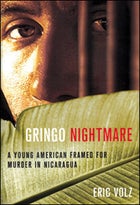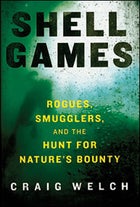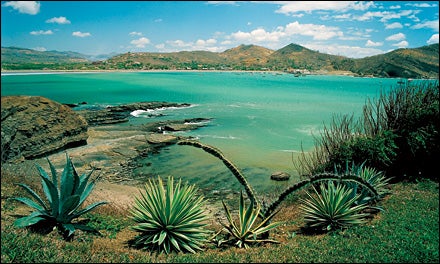ERIC VOLZ HAS BEEN AN ENIGMA to me ever since I met him in Nicaragua’s Modelo prison in early 2007. He’d been convicted of the rape and murder of his Nicaraguan ex-girlfriend, Doris Jiménez, and sentenced to 30 years’ hard time. I’d spent months investigating the case for ���ϳԹ��� and was certain of Volz’s innocence. He knew this when we met, and still he was elusive—referring to himself in the third person, lamenting how much money the situation had cost him, reluctant to express empathy for the dead girl, pitching story ideas about staying fit in jail. With the international press descending on the story, this was a bewildering tack to take.
Gringo Nightmare, by Eric Volz
 Gringo Nightmare, by Eric Volz
Gringo Nightmare, by Eric VolzVolz was eventually exonerated and released after 13 long months of confinement, illness, and abuse. Now, he tells his own story in Gringo Nightmare: A Young American Framed for Murder in Nicaragua (St. Martin’s Press, $26), a tough tale of survival against long odds. Volz portrays himself as an altruist who went to Nicaragua to help the people and to connect with his grandparents’ Central American roots. The truth is more complicated: Though he fell in love with Nicaragua, he participated in the local gringo real-estate frenzy and turned a gritty community newsletter into a glossy lifestyle magazine. By openly living with Jiménez, he interposed himself into the conservative seaside town of San Juan del Sur in ways few outsiders would dare. After her death, Volz played lead investigator, getting in police officials’ faces before they arrested him.
Volz walks us through his ordeal in clear, engaging prose, focusing on the trial and the challenges of daily life in rank Central American prisons. His struggles to carve a niche for himself among actual murderers are tense and awful, and his ultimate release and flight from Nicaragua are nothing short of harrowing. But the memoir is most surprising in what it doesn’t reveal: any real change in the author. Volz spills a surprising amount of ink, for example, launching barbs at NBC’s Dateline, which ran an unflattering segment on him in 2007. (He calls the host, Keith Morrison, “a blow-dried correspondent in designer jeans.”) The vitriol doesn’t end there. In obliquely accusing another man of Jiménez’s murder, despite a lack of hard evidence, Volz commits an ironic rush to judgment. After all, it was hasty arrow-slinging on the part of the Nicaraguan authorities that incarcerated him. This is the man I met in prison—innocent beyond any doubt, but blind to his own role in bringing this nightmare on himself.
Books: Shell Games
Required Reading
Shell Games, by Craig Welch
 Shell Games, by Craig Welch
Shell Games, by Craig WelchThe sentences in Craig Welch’s
Shell Games: Rogues, Smugglers, and the Hunt for Nature’s Bounty
(William Morrow, $26) are not particularly elegant. But they don’t need to be: Welch, a crack reporter and chief environmental writer for The Seattle Times, turns out a true-life shellfish caper, centered on the efforts of Washington Department of Fish and Wildlife detectives to lock up the West Coast’s largest poacher of geoducks—outsize, phallic-looking clams that fetch top coin on the Asian market. The book is full of characters Raymond Chandler would have conjured, if Chandler had been a shellfish nut: crooks named Slim and Spook, detectives scouring Puget Sound in a vessel called Clamdestine, and an informant turned geoduck kingpin with a whalebone necklace and a talent for carving elaborate totem poles. The prose occasionally delves into the stuff of hackneyed mysteries—”Chasing Tobin [the kingpin] would be like grabbing at smoke,” Welch writes—but, then, the cops-and-robbers nature of the story makes you want to read the whole book in one gulp. That’s a good thing, since page-turning mysteries that make you think are a rarity. It would be impossible to read Shell Games and not come away with a fresh, considered perspective on your next order of clams.
Books: By Our Contributors
Eaarth, by Bill McKibben
 Eaarth, by Bill McKibben
Eaarth, by Bill McKibbenEnvironmental author emeritus Bill McKibben’s
Eaarth: Making a Life on a Tough New Planet
(Henry Holt, $24) makes a provocative case for smaller appetites in the climate-changed era, but read it for the first few chapters—the most (depressingly) powerful rebuttal of the global-warming-skeptic argument we’ve seen.
Anonymous blogger Bike Snob NYC busts out of cyberspace in
Bike Snob: Systematically & Mercilessly Realigning the World of Cycling
(Chronicle Books, $17), less manifesto than highly entertaining guide to finding your way on two wheels.
Mark Sundeen gives Captain Sig Hansen, of Deadliest Catch fame, a literary helping hand in
North by Northwestern: A Seafaring Family on Deadly Alaskan Waters
(Thomas Dunne Books, $26), a chronicle that reads like a collection of your crazy buddy’s bar stories about his crazier old man.
And Donovan Webster, inspired by a DNA test, searches for his identity from warthog-hunting grounds in Tanzania to circus tents in Uzbekistan in
Meeting the Family: One Man’s Journey Through His Human Ancestry
(National Geographic Books, $26).



